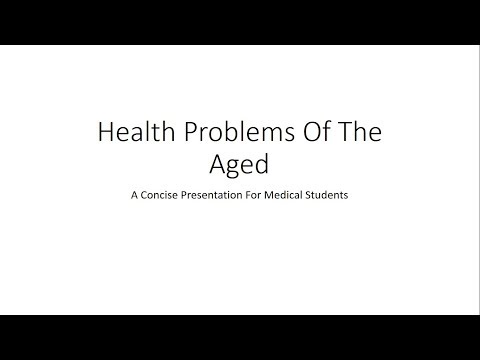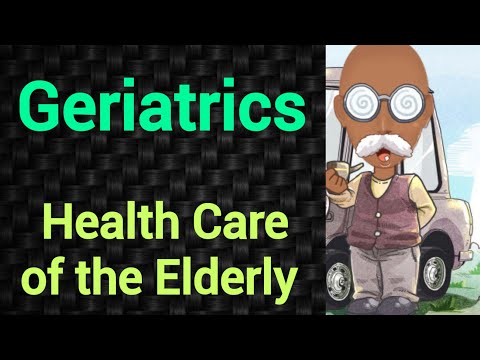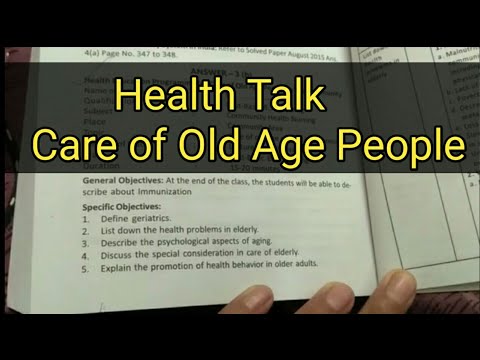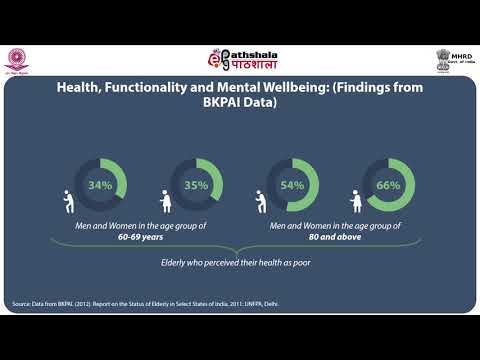Health Problems in the Elderly
Contents
- Introduction
- The most common health problems in the elderly
- The risk factors for developing health problems in the elderly
- The impact of health problems in the elderly
- The challenges of managing health problems in the elderly
- The role of technology in managing health problems in the elderly
- The importance of lifestyle changes in managing health problems in the elderly
- The role of caregivers in managing health problems in the elderly
- The future of health care for the elderly
- Conclusion
The elderly population is susceptible to a number of health problems. These can include everything from mobility issues to cognitive decline. It’s important to be aware of these potential problems so that you can take steps to prevent them or mitigate their effects.
Checkout this video:
Introduction
The elderly population is growing at an unprecedented rate. In the United States people aged 65 and over make up 15 percent of the total population, and this number is expected to rise to 23 percent by 2050. With such a large percentage of the population aging, it’s no surprise that health problems in the elderly are a major concern.
There are a number of reasons why health problems in the elderly are on the rise. First, people are living longer than ever before thanks to advances in medicine and technology. Additionally, baby boomers – those born between 1946 and 1964 – are now reaching retirement age, and this large cohort is also experiencing higher rates of chronic health conditions such as obesity, diabetes, and hypertension.
With an aging population come a number of challenges related to providing adequate healthcare. The elderly are more likely to have multiple chronic health conditions that require ongoing treatment, and they are also more likely to experience physical decline and frailty. Additionally, many elderly individuals live alone or have limited family support, which can make it difficult to get to doctor’s appointments or manage medications.
There are a number of ways to address health problems in the elderly population. First, it’s important to raise awareness about the issue among both healthcare providers and the general public. Additionally, efforts should be made to improve access to healthcare for the elderly through initiatives such as expanding Medicare coverage or increasing funding for home care services. Finally, research is needed to develop new treatments and preventive measures specifically for older adults.
The most common health problems in the elderly
There are a number of health problems that are common in the elderly. These include arthritis, osteoporosis, Alzheimer’s disease, heart disease, stroke, and cancer.
These health issues can cause a great deal of pain and suffering for the elderly. They can also lead to a loss of independence and mobility. It is important for family and friends to be aware of these problems so that they can provide support and assistance when needed.
The risk factors for developing health problems in the elderly
There are a number of risk factors which can contribute to the development of health problems in the elderly population. Many of these factors are lifestyle related, and as such, are preventable. modifiable. Some of the most common risk factors include:
– Poor nutrition
– Limited physical activity
– Smoking
– Excessive alcohol consumption
– Poor oral hygiene
– Poor mental health
– social isolation
These risk factors can lead to a number of chronic health conditions, such as heart disease, stroke, cancer, diabetes, arthritis and osteoporosis. In addition, the elderly are also at increased risk for falls and fractures due to decreased muscle mass and bone density. This can further lead to loss of independence and quality of life.
The impact of health problems in the elderly
The elderly population is growing rapidly, and with it comes an increase in health problems. As people age, they are more likely to suffer from chronic conditions such as heart disease, diabetes, and arthritis. Additionally, the elderly are more likely to experience mental health problems such as depression and anxiety.
These health problems can have a significant impact on an individual’s quality of life. They can lead to decreased mobility, increased pain, and a decline in cognitive function. Additionally, these health problems can put a strain on family members and caregivers who are responsible for providing care.
If you are an elderly individual or are caring for someone who is elderly, it is important to be aware of the potential health problems that can occur. By understanding the impact of these health problems, you can take steps to prevent them or manage them effectively.
The challenges of managing health problems in the elderly
The elderly population is growing rapidly worldwide. In the United States, people 65 and older make up 15 percent of the population, and that number is expected to rise to 20 percent by 2030. This aging population presents a number of challenges, including an increase in chronic health problems.
Chronic diseases such as heart disease, stroke, cancer, and diabetes are responsible for 7 in 10 deaths among Americans each year, and those 65 and older are at especially high risk. According to the Centers for Disease Control and Prevention (CDC), more than 80 percent of older adults have at least one chronic condition, and more than 50 percent have two or more.
These chronic health problems can be managed in many cases, but doing so can be difficult. The CDC notes that older adults may have trouble understanding their medications, following treatment plans, or paying for their care. They may also have difficulty getting to doctors’ appointments or understanding medical information.
In addition to the challenges posed by chronic health problems, the elderly population is also at risk for a number of mental health issues. According to the National Institute of mental health (NIMH), about 20 percent of adults aged 55 or older experience some form of mental illness each year. The most common problems include anxiety disorders, depression, and dementia.
Mental health problems can be just as difficult to manage as physical health problems, and often they go hand-in-hand. The NIMH notes that older adults with chronic physical illnesses are at especially high risk for mental health problems like anxiety and depression.
Managing health problems in the elderly population is a complex challenge that requires a comprehensive approach. From understanding medications to getting to doctors’ appointments, there are a number of factors to consider. But with proper care and management, many of these problems can be controlled effectively.”
The role of technology in managing health problems in the elderly
The role of technology in managing health problems in the elderly is an important one. With an aging population, there is an increased demand for healthcare services. However, the traditional model of healthcare delivery is not well suited to meet the needs of this population.
Technology can play a key role in addressing the needs of the elderly. For example, telehealth services can provide access to care for those who live in remote areas or who have difficulty traveling to see a healthcare provider. Telehealth services can also help to reduce the risk of hospitalization or re-hospitalization by allowing patients to be monitored more closely.
In addition, technology can help to improve communication between patients and their caregivers. This is particularly important for those who have Alzheimer’s disease or other forms of dementia. By using video conferencing or other forms of communication, caregivers can stay in touch with their loved ones and provide them with support and assistance.
The importance of lifestyle changes in managing health problems in the elderly
As people age, they are more likely to develop various health problems. Some of these health problems can be managed effectively with lifestyle changes. It is important for the elderly to be aware of the importance of lifestyle changes in managing their health problems.
There are many different health problems that can affect the elderly. Some of the most common health problems in the elderly include arthritis, heart disease, stroke, and diabetes. These health problems can often be managed effectively with lifestyle changes.
Arthritis is a common health problem in the elderly. Arthritis can cause pain and stiffness in the joints. There are many different treatments for arthritis, but lifestyle changes are often the most effective. Some simple lifestyle changes that can help manage arthritis include exercise, weight loss, and avoiding smoking.
Heart disease is another common health problem in the elderly. Heart disease can cause chest pain, shortness of breath, and heart attacks. Lifestyle changes that can help reduce the risk of heart disease include exercise, eating a healthy diet, and avoiding smoking.
Stroke is a serious health problem that can occur in the elderly. Stroke occurs when blood flow to the brain is interrupted. This can cause paralysis, difficulty speaking, and even death. Lifestyle changes that can help reduce the risk of stroke include exercise, eating a healthy diet, and avoiding smoking.
Diabetes is a common health problem in the elderly. Diabetes occurs when blood sugar levels become too high. This can cause serious health problems such as heart disease, stroke, and kidney damage. Lifestyle changes that can help manage diabetes include exercise, weight loss, and eating a healthy diet
The role of caregivers in managing health problems in the elderly
As our population ages, more and more people are finding themselves in the role of caregivers for elderly loved ones. This can be a challenging task, as elderly people often have a variety of health problems that need to be managed.
There are a few things that caregivers can do to help manage the health problems of their elderly loved ones. First, they should make sure that the elderly person sees their doctor regularly. This will help to ensure that any health problems are detected early and treated appropriately.
In addition, caregivers should help their elderly loved ones to maintain a healthy lifestyle. This includes eating a healthy diet, getting regular exercise, and avoiding risky behaviors such as smoking or excessive alcohol consumption.
Finally, caregivers should be aware of the signs and symptoms of common health problems in the elderly, such as heart disease, stroke, diabetes, and cancer. If any of these problems are suspected, it is important to seek medical attention immediately.
By following these tips, caregivers can play a vital role in helping their elderly loved ones to stay healthy and active.
The future of health care for the elderly
The future of health care for the elderly is a topic of much debate. There are a number of factors to consider, such as the increasing life expectancy of seniors, the costs associated with caring for an aging population, and the challenges posed by chronic diseases.
There are many different possible scenarios for the future of health care for the elderly. One possibility is that advances in medical technology will allow seniors to live longer and healthier lives. This could lead to an increase in the number of seniors who are able to live independently, and a decrease in the need for nursing home care
Another possibility is that the costs associated with caring for an aging population will become prohibitive, and that access to quality health care will become increasingly limited. This could lead to an increase in the number of seniors who are forced to rely on family members or friends for care, and a decrease in the quality of life for those who are able to remain independent.
No matter what the future holds, it is clear that there are a number of challenges that must be addressed in order to ensure that seniors have access to quality health care. These challenges include finding ways to pay for care, improving the quality of long-term care facilities, and developing better treatments for chronic diseases.
Conclusion
In conclusion, the elderly are more susceptible to a variety of health problems for a number of reasons. They are more likely to have chronic illnesses, which can lead to other health problems. They are also more likely to take medications that can interact with each other and cause problems. In addition, they may be less able to care for themselves, which can lead to problems such as dehydration or malnutrition. It is important to be aware of these risks and take steps to protect the elderly from them.





